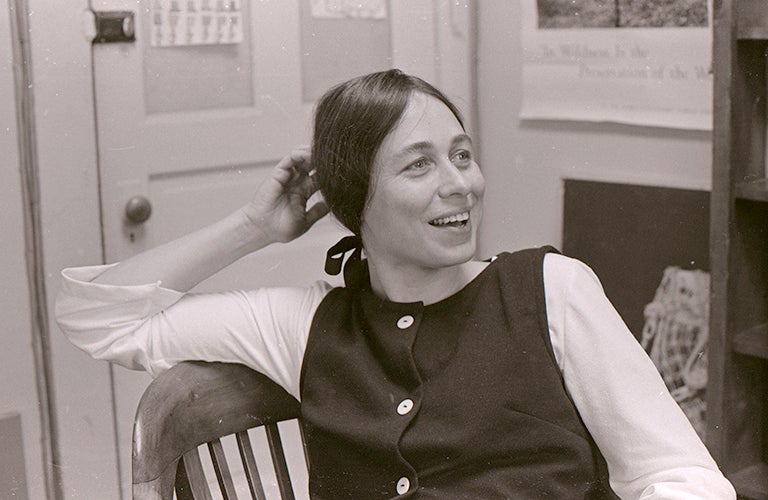Q & A: Margaret Hall

Professor Margaret Hall, pictured here in 1972, retired this spring after more than 50 years teaching at Georgetown. (Photo courtesy Georgetown University Archives)
April 4, 2018 — Few people in history can claim to know Georgetown as well as Professor Margaret Hall.
Prof. Hall retired from teaching this spring after spending more than 50 years on the Hilltop, including 47 as a full-time professor in the Department of Sociology. One of the first women to be granted tenure at Georgetown, she served as department chair on two separate occasions and also directed the women’s studies program. Her research focused on social intelligence and the social construction of identity and behavior.
We caught up with Prof. Hall to talk about her impressive career at Georgetown, the evolution of her discipline, and her advice for today’s students.
How did you make the decision to get into teaching?
My mother tells me I played teacher with my dolls, so I think it was a long, deep-seated quest on my part to do something with people who could learn from me.
What brought you to Georgetown?
I married an American in London and followed his career for most of my career. It was really the learning process that interested me, and as a social scientist, I wanted to change something in the world. It seemed very productive for what I had in mind, trying to do something about social intelligence.
You said you wanted to change something about the world. Can you expound on that?
I bumped into almost inexplicable examples of pain. I was a privileged young kid, an only child who saw a lot of poverty in my town, Manchester, a city of the industrial revolution. It was a poor, working-class area, but I wasn’t in the poor part. The gap in resources grabbed me.
To what extent can one change what is given at the turning points in life? What drew me in was how I had a greater sense of control over my life, and I wanted to pass that on. I couldn’t perform miracles, but I could change lives in ways that mattered.
Talk about your own research and how the field of sociology has evolved.
There’s certainly more multidisciplinary work in research areas — you can’t get away with only being a member of a minor or less-resourced discipline. You need to cross boundaries and integrate research if you want to do something substantial.
There was no sociology department at all when we first came here, so we had our parallel development as a department. We tried to find meaningful curricula — we always tried to do something new, something traditional, something individual and something as a group. It’s been a great challenge.
I think my own research specialty in social intelligence is just an example of new ways to approach studying and problem-solving. The discipline of sociology at Georgetown is the place where we do this kind of new thinking.
What has changed on the Hilltop since you started?
The increase in residential accommodation available is important — I think students are more able to do evening activities and projects than they were before. Beautiful buildings.
But there’s a kind of “inside change” in how the students think, not just the “outside change” of things like new buildings. We have to see the link here to science — not just science that we learn in the classroom, but science in society. We were in a search for a description, and now it’s a search for an explanation.
What’s stayed the same?
Georgetown has a presence. It’s a very reassuring presence, and it’s good to be able to get together with others in ways that would make major differences. I never thought that parts of society in people’s lifetimes would be subject to these pressures.
What’s your favorite memory from Georgetown?
It isn’t a single memory, but it’s the process of becoming more American. I was born in Manchester and came over in ’63, having married an American sweetheart. It helped make me more American to come to Georgetown, go through ceremonies like graduation, and really feel part of the country. That happened through the business of Georgetown.
Any advice for sociology students today?
One of my hardest problems with students is the attitude of ‘What can you do? You can’t do anything.’ Well, you’ve got to do something. We’ve got to assume this responsibility ourselves.
You just need to start the first few steps of the journey toward your interests or ambitions. You can’t leave all your other responsibilities alone, but you can start by taking charge of a small part of a project, then a deeper part of the project. I always tried to get students interested in the human responsibility for changing the world.
Once at a College Executive Council meeting, we were doing a rewrite of the Georgetown mission statement. We had a discussion on the role of change and participation, and I said it can’t just say “participation,” it has to focus on an “active participation.” And that phrase is still there today.
Interview conducted by Patrick Curran and edited for length and clarity.